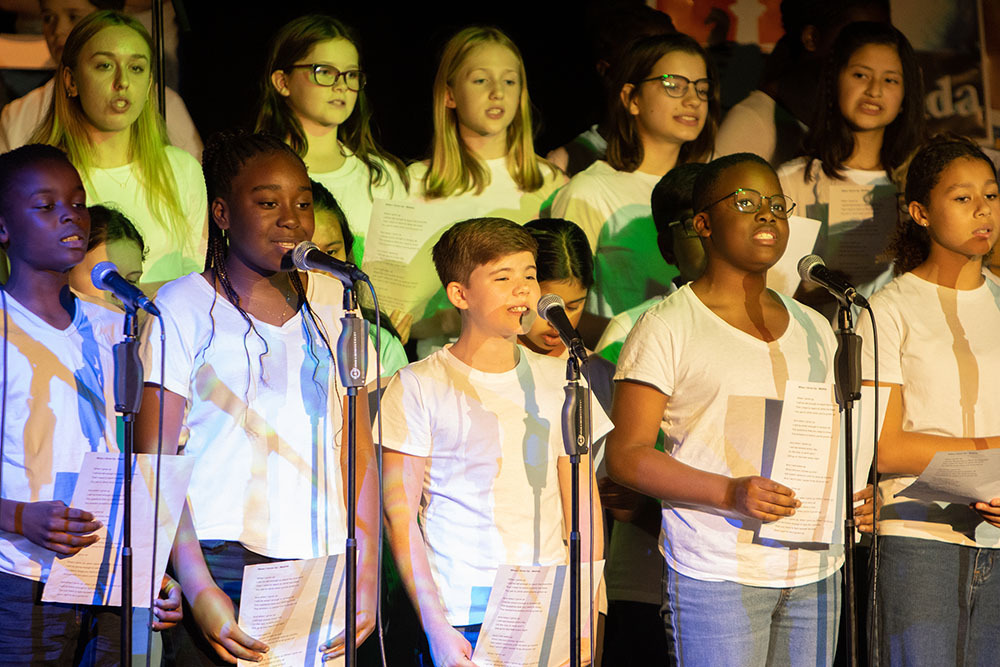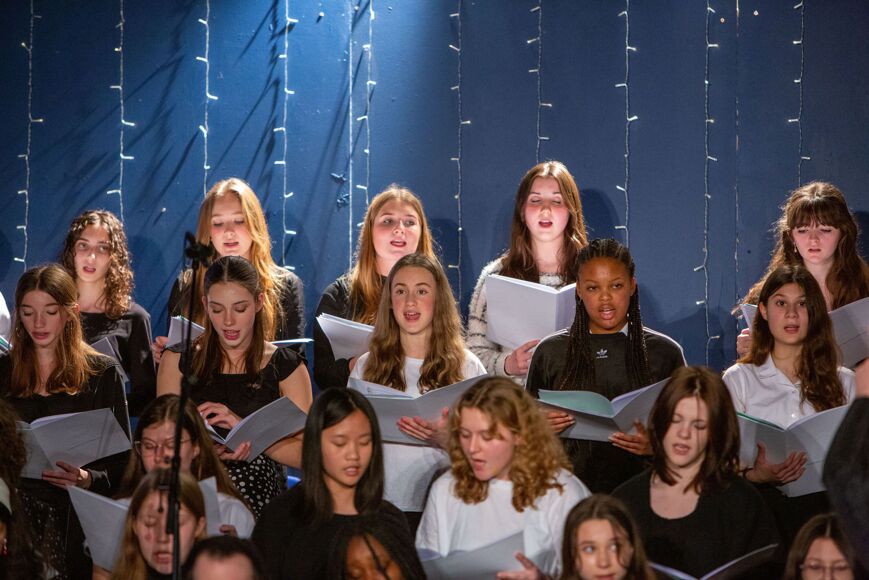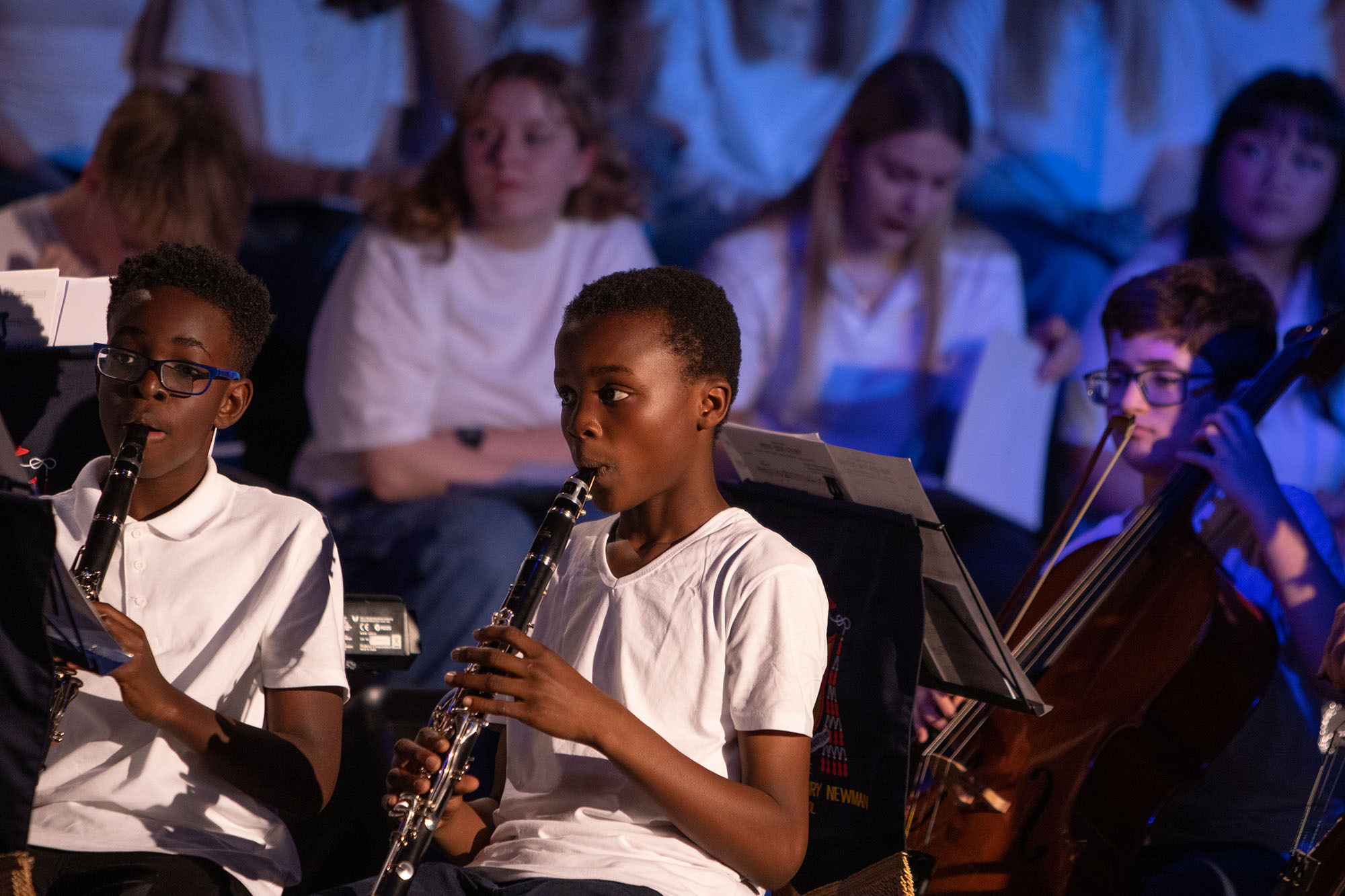Music

Curriculum Statement: Music
'Music education opens doors that help children pass from school into the world around them - a world of work, culture, intellectual activity and human involvement' Gerald Ford
Curriculum Aims:
Our key aims in Music at JHN are to develop imagination and creativity, whilst building knowledge, skills and understanding in the subject. As our students are on a journey of self-discovery and faith, they discover the place of music in their lives and the role of music in faith worship. We also work with our students to see the positive contribution that their music can make to the lives of others. Our curriculum builds on prior experience, whether that be primary school music lessons, the wider opportunities instrumental scheme or peripatetic instrumental lessons. We give all pupils an opportunity to learn a musical instrument, following an informal learning model, whilst also providing the necessary formal structure to allow those with prior knowledge the structure within which to flourish. This provides memorable classroom experiences, enabling students to express themselves and to shape their personality through musical encounters. Studying music enables students to take responsibility, develop collaborative skills and to problem solve. Our growth-mindset approach aims to make music accessible to all, equipping pupils with the musical skills to understand, make sense of and enjoy the music and sounds in the world around them, allowing it to move, transport and shape them.
Curriculum Features:
Our curriculum is shaped by our whole school vision, enabling all pupils to become the very best version of themselves they can possibly be. Our music courses offer students opportunities to perform, compose and listen to music from a range of different musical cultures. The elements of music are at the heart of all that we teach, meaning that the fundamentals of music notation: pitch, harmony, texture, and rhythm are at the forefront of lessons. We value Carl Orff's notion of learning through play and this underpins our Year 7 curriculum. We empower our students' musical journeys to grow by offering Musical Futures in Year 8, a tried and tested, practical approach to musical learning that gives students freedom to explore music in an engaging way, replicating the way that creatives operate in the workplace. This approach gives our students opportunities to discover their own musical identities and to develop both personally and socially, introducing careers in the music industry through all learning programmes.
The Musical Futures ideology underpins the practical work of our department at all levels, providing informal practical music learning opportunities in lessons. Professor Lucy Green's research cites that popular musicians learn in an informal, social setting rather than a formal, organised approach and that this should be used as a model in schools, reflecting the musicians’ workplace. Musical Futures is an excellent starting point and leads to pupils’ ambition and desire to receive more formal instrumental or vocal training, mirroring Pink’s notion of ‘drive’, combining autonomy, mastery and purpose. When pupils are given choice, have the ambition of learning the instrumental skill and fulfilling their role in the ensemble, pupils put their energy into mastery of technique. The GCSE builds on the KS3 curriculum, with a particular focus on the higher level skill of composition. We offer a range of courses beyond GCSE, which offer the best opportunities for young people wanting to access careers in the world of music and music technology. Students with more of a classical interest flourish in the rigor of A Level music where they achieve academic success. We are proud to support many of our sixth form musicians in Conservatoire application. We work closely with outside agencies, including Hertfordshire Music Service, Gordon Craig Theatre, Benslow Music Trust, local recording studios and JHN alumni working to ensure we are meeting the needs of our pupils.
Co-curricular experiences:

It is important that students are offered a wide range of opportunities to experience music-making and to widen their appreciation of music in the world. These include:
- Pupils are encouraged to use musical skills in contributions and offerings in collective worship, as well as in supporting fundraising ventures such as Jazz Night, Christmas Concert and Kiss Week.
- Extra-curricular opportunities that are open to all students such as Choir and Rock School. Concert band and Jazz band that build on students' prior experience
- Opportunities to experience music as a performing art, integrated with acting and dance, developing cross-curricular opportunities with Art, Drama and Dance.
- The history of music in all key stages taught in conjunction with western history and the implication of world events on music is made explicit.

What follows is a current summary of the intended subject curriculum content in each year of the key stage. It highlights the key knowledge and skills intended for learning, and some of the ways progress in the curriculum is to be assessed. It clarifies the key questions students should be addressing and gives links to help students and families to develop this learning further.
KS3
Pupils are introduced and encouraged to develop their skills in relation to the curriculum requirements of Music. Through the exploration of music in the classical, popular and world music genres, skills such as listening, composing, analysing and performing are explored through collaborative situations. Pupils experience Music by working in pairs on keyboard and computer equipment, in groups using a variety of instruments and through whole class opportunities with singing and listening. Assessment is carried out at each module through a variety of methods including verbal feedback, peer and self-assessment and through the relevant steps of progress.
KS4
Throughout Key Stage 4, pupils are preparing for the OCR GCSE examination (J536). The main focus of study and assessment requires pupils to demonstrate their knowledge of music through performance, compositional and analytical skills. Assessment is through a variety of methods, with the performance and compositional elements accounting for 60% of the final GCSE grade. The remaining 40% is assessed via a timed listening examination in which pupils are tested aurally on their knowledge and understanding of a variety of different styles of music. The listening course is a varied course, comprising of pop conventions through time, world music, film music and the classical concerto.
KS5
Students are offered two courses at Key Stage 5, namely the GCE course at AS (H143) and A Level (H543) with OCR and the very popular BTEC Vocational Music course at Level 3 Diploma.



